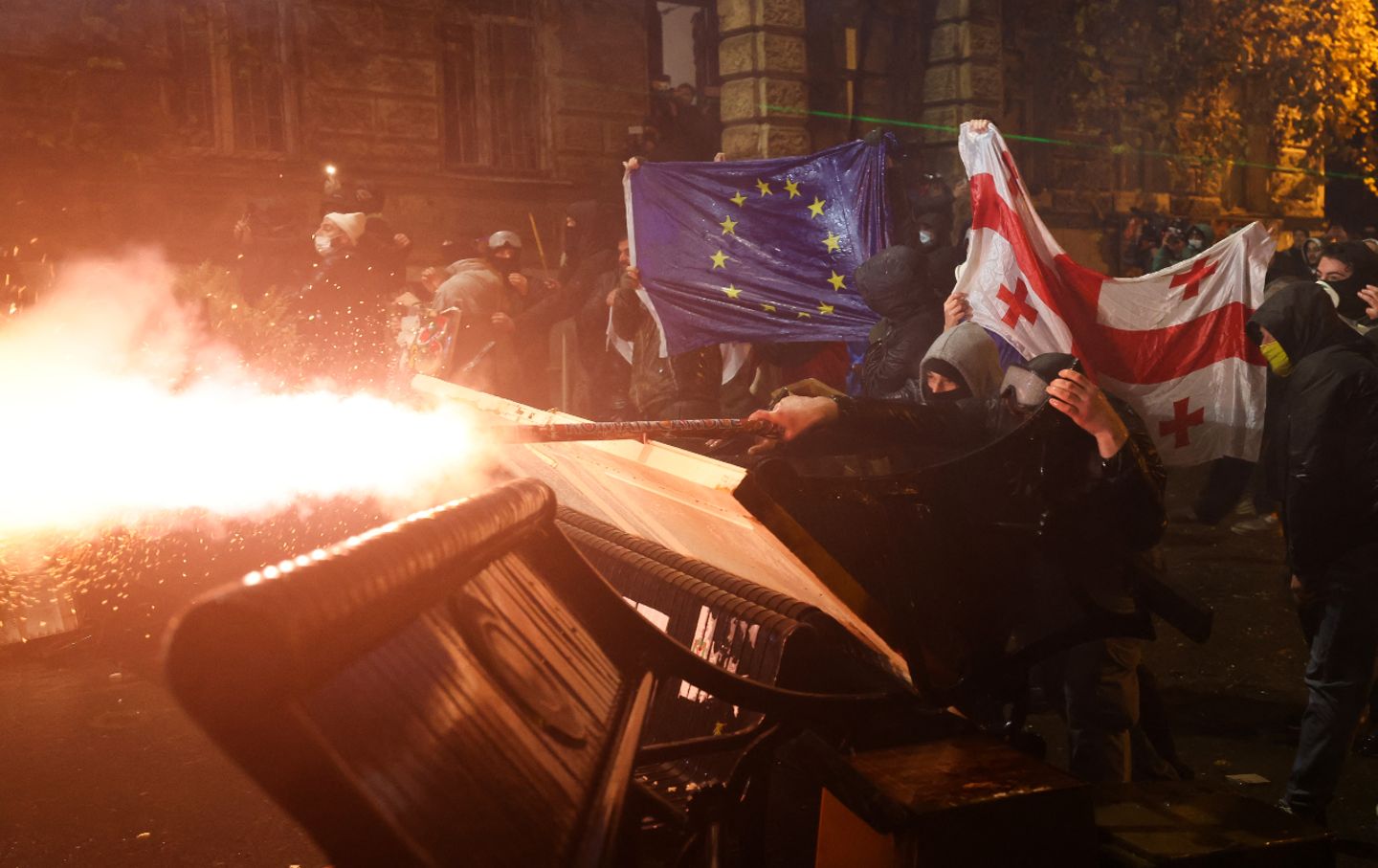For Those Who Know They Have Not Done Enough to Stop Israel’s War on Gaza
It is shamefully easy to keep going about one’s life while Israel continues its onslaught on Gaza with full US support—and it’s absolutely essential to resist that impulse.
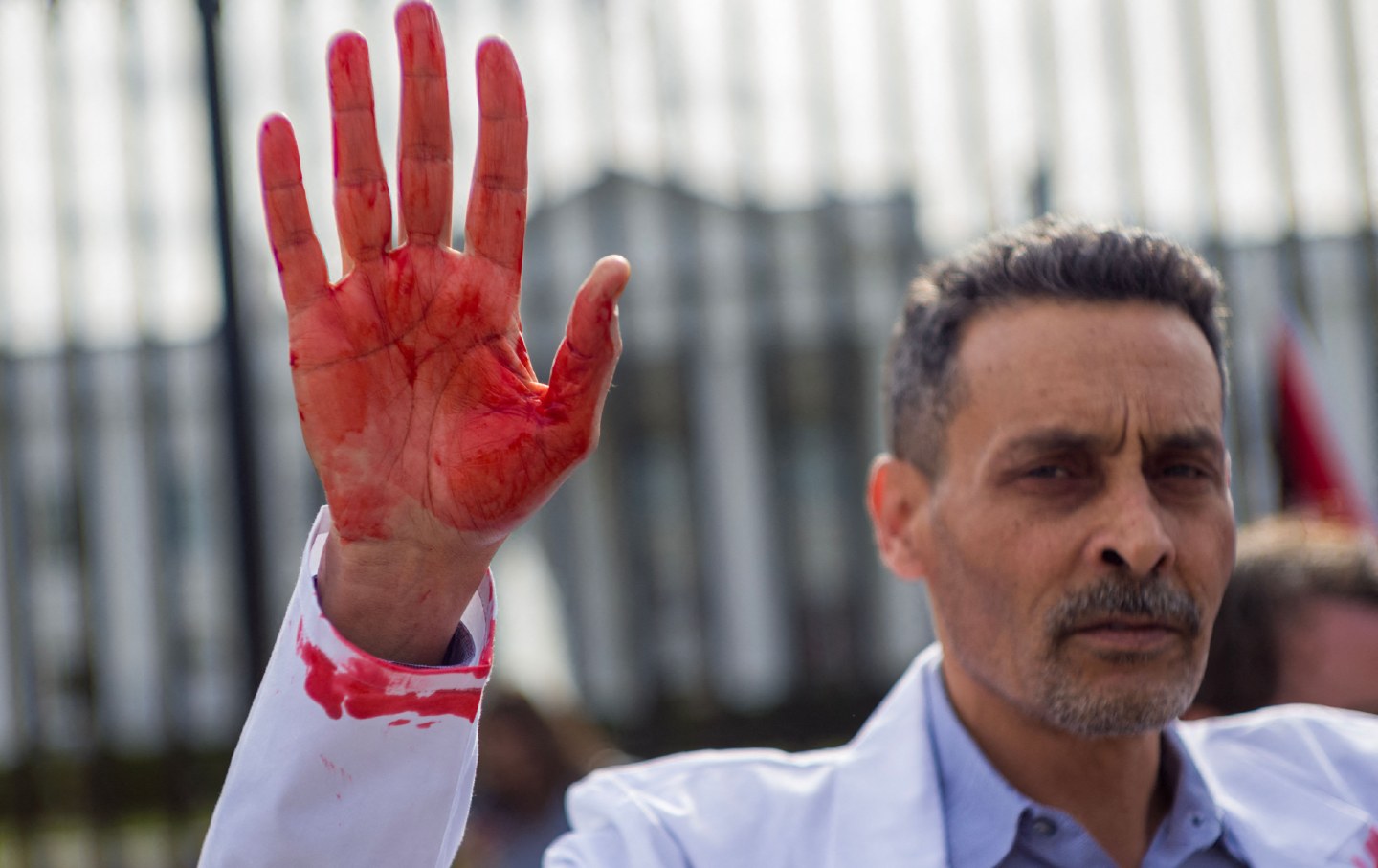
Palestine solidarity activists call for a ceasefire in front of the White House in Washington, DC, on November 17, 2023.
(Mandel Ngan / AFP via Getty Images)
It’s a Saturday night in late August. I’m sitting in the main hall of the Givatayim Theater, just outside of Tel Aviv, with my 5-year-old son, Carmel. We are both completely immersed in an extraordinary performance that combines light, sound, coding, video art, and a lot of humor with some audience participation. A truly exquisite show. And then it hits me again. The feeling I have had so many times before throughout this year. It’s a deep sense of guilt, of horror, rooted in the profound injustice embedded in our reality.
We are living through a war, one that’s raging not far from here. Our country is killing tens of thousands of Palestinians and devastating the lives of two million people in Gazan. Beneath them, in the tunnels, dozens of hostages are still alive—people the state has clearly abandoned, left to die or be murdered, one by one.
Not far from the theater, just a few minutes walk up Derekh HaShalom—the Peace Road—there’s a protest happening right now, calling for an end to the war and for the release of the hostages. And yet, here I am, sitting with Carmel, laughing, enthralled by the show, as if everything happening is on a different planet, worlds away from this little bubble. As if we were carefully sealed in our own little Zone of Interest.
That was more than three months ago. In the intervening days and weeks—as we marked one year since the October 7 massacre and the beginning of this brutal war, with absolutely no end in sight—I have found myself overwhelmed by regret for not doing enough to stop the horrifying crimes my people are committing against Palestinians. It weighs powerfully on my soul—as I believe it should weigh on the soul of every human being with a conscience, especially here in Israel and in the United States.
It is hard to exaggerate the severity and horror of what we Israelis have done—and continue to do, with the blessing and the full military, financial, and diplomatic support of the Biden administration—to Gaza this past year on top of the decades’ long and ongoing crimes of apartheid.
We are witnessing an ethnic cleansing on epic scales, a mass murder carried out with the full awareness that countless civilians, entire families, have perished—and will continue to perish. A significant percent of Gaza’s homes and infrastructure, including schools and universities, have been obliterated by air strikes, artillery, and torching. Disease is spreading, and the healthcare system has collapsed, as the Israeli military routinely fires on hospitals. Meanwhile, people are dying from hunger, while others fight for access to food and clean water, as the state continues to limit entry of basic aid and supplies. The scale of atrocity is so extensive the International Criminal Court has issued arrest warrants for Benjamin Netanyahu and his former minister of defense Yoav Galant, charging them with war crimes and crimes against humanity, and the International Court of Justice has found it plausible that is Israel is committing genocide in Gaza. A state formed by the survivors of genocide is now considered, by many leading scholars and jurists, to be doing the same to others.
All of this, it’s crucial to emphasize, is not only utterly despicable and outrageous, but could have been avoided—first, by ending the occupation and guaranteeing freedom and justice for Palestinians long ago, and then by avoiding this war and signing a ceasefire and hostage release deal right after October 7, or at any point after that. Even the Israeli security establishment has acknowledged that option is there on the table, ready for Israel to take it, potentially saving countless lives. A recent poll on Israeli TV found that 71 percent of Israelis now, only now, support ending the war. Yet an end is not in sight.
So I ask myself: Why haven’t I done more? I know how to do more. In the past, I have organized protests, petitioned the High Court, and participated in countless demonstrations. I have blocked roads, marched with oppressed and resisting Palestinians in the West Bank, been shot at and beaten by soldiers, and even imprisoned for two years as a conscientious objector. During the first Gaza war in 2009, I was part of a group that blocked the entrance to an air force base from which bombing sorties were launched. And now, as Brecht wrote, “when evil-doing comes like falling rain”? Less so. At a moment when it is needed more than ever, I feel like I am failing my basic human responsibility.
As I have searched my soul I’ve come up with several answers, reasons that are almost convincing enough to turn into explanations. I tell myself that my role as the director of +972 Magazine and codirector of Local Call means that much of my time is dedicated to work that directly contributes to resisting the war. It’s demanding work, and I genuinely believe it is journalism that’s making a difference. I’m incredibly proud of the team at both outlets, especially given the Israeli mainstream media’s near-total enlistment in government propaganda, which has erased the true story of Gaza from the public’s consciousness. But even as I sink hours into telling the stories the other Israeli journalists refuse to tell, I feel like work is not enough, and should not absolve me of my duties as a citizen and as an activist, as a human.
I also remind myself that, in the beginning, there was fear—the profound fear following the shock of the Hamas massacres against entire families, migrant workers from Thailand, elderly people on a day trip, people at a party, Palestinian citizens, as well as the abductions and the sexual abuse of women on that day and later in captivity. It did not take me long at all to put the horror into the context of decades of oppression by Israel, which does not justify the crimes committed by Hamas, just as those do not justify the crimes being committed by Israel, such as the killing of 710 babies who never reached the age of 1. Still, I feel the initial horror must have played into my response.
Like others, I spent weeks, on and off in different parts of the year, shielding my family from rocket, missile, and drone attacks, navigating school closures, and supporting relatives who had to flee their homes in the Israeli north because of Hezbollah shelling. And then, there was the birth of our second child, Lev, in January—an event that opened a new chapter of sleepless nights and caring for two kids. Amid all this, I tell myself, it has been hard to find the emotional capacity or simply the time to take on a major task like organizing against the war.
I remind myself as well how, in the first months, the repression against any anti-war sentiment was unprecedented—most perniciously against Palestinian citizens of Israel, but also against Jewish citizens. I was beaten by police at a protest in Jaffa and nearly arrested—spared only because of my press credentials. Meanwhile, a violent mob attacked the home of my friend the leftist journalist Israel Frey, who had to escape under the cover of police in the dead of night. The fear of police and societal violence, a fear I hadn’t known when I was younger and responsible only for myself, held me back. Even within my own home, there has been tension, as my partner, my love, has been transformed by October 7, opening a deep political chasm between us, one which I have tried to learn from, to grow from, and not to be held back by—but one that’s always present.
In addition to all of this, there is the accumulated sense of frustration in trying to converse with my own society, the one responsible for all of this. I and others have been trying to reach Israelis, either by talking about their own interest in ending the war, or focusing on the moral disaster of what we are doing to Palestinians. We have tried using information, voices, commentary that cannot be found in mainstream outlets. But to no avail. The vast majority of Israeli media and public discourse continue to be completely closed to any talk of Palestinians, to any criticism of what the army is doing, and to any alternatives. How many times can one write, and protest, and explain, and yell—while only seeing the situation get worse?
There’s a reason I mention all this, and mention it now. It’s not simply that I want to unburden myself (although I won’t discount that), but because I suspect that I am not alone, that there are scores of other people—around the world, but particularly in the United States—who have seen the atrocities our countries are committing, who know they must be resisted, and yet are keenly aware that they have not done enough.
Like me, perhaps, these people have learned of the many harrowing crimes that nations have committed throughout history and have asked themselves: where were the people of conscience? Like me, perhaps, they believed they would have acted differently, would have been among the righteous. And yet, like me, when history came knocking and demanded they step up, they too have found their actions wanting.
Perhaps, like me, they simply needed to be reminded that failure is not predetermined.
When I first started writing this text, it was just before Yom Kippur, the Jewish day of repentance. In the time since, I have recommitted myself to fighting. I have gone back on the streets to protest, in spite of the risk. I have tried to double down on efforts to force Israelis to see the reality of what we are doing—through journalism and social media and by talking to people around me more—even when it sometimes feels as helpful as banging my head against a wall. Sometimes it does form a crack.
Popular
“swipe left below to view more authors”Swipe →And I have once again joined efforts to promote boycotts, divestment, and sanctions against Israel—including signing a letter, alongside 3,700 other Israelis, calling on the international community to “implement every possible sanction” to “save us from ourselves and use real pressure on Israel for an immediate ceasefire.”
The Israeli government has poured significant resources into quashing the BDS movement, both at home and abroad, because it knows that BDS remains one of the most effective tools for reining in rogue states—and one of the most serious threats to its ability to make endless war on Palestinians. And so we are literally begging the international community to intervene immediately and impose any and all restraints on Israel that it can.
This is where you, the reader of this text, comes in. If, like me, you feel like you have not done enough to stop the onslaught funded and backed by your government, this is the time to act. The new US administration is clearly going to be an enemy of Palestinian rights—more hostile even than the Biden administration—which puts more responsibility on ordinary civilians to act. It may not be easy; it may require you to go up against a government that, as in Israel, actively wants to silence you. But, as one of your own great freedom fighters wrote, power concedes nothing without a demand.
It is time for you to join us by promoting the BDS campaign in whatever way you can—at work, at university, vis-à-vis your retirement fund, your union, or our religious community, and most importantly the incoming administration, which in spite of everything we know about it may somehow still be open to stopping this madness. As much as Trump is committed to Israel, to Netanyahu, to annexation and settlements, he also wants to keep Arabian Gulf countries on his side, and minimize wars so he can cut back on American spending and active intervention in the region. That internal contradiction in Trump’s priorities could be something we can exploit.
But whatever Trump does, it is time to put all excuses aside—and to fight.
* * *
To deal with a second regret—about not doing enough for his own people, to face antisemitism and threats to collective Jewish life in Israel-Palestine, and how all of this connects with the war and discussions on the global left—the author has written a separate piece for +972 Magazine. You can read it here.
Support The Nation this Giving Tuesday
Today is #GivingTuesday, a global day of giving that typically kicks off the year-end fundraising season for organizations that depend on donor support to make ends meet and enable them to do their work—including The Nation.
To help us mobilize our community in this critical moment, an anonymous donor is matching every gift The Nation receives today, dollar-for-dollar, up to $25,000. That means that until midnight tonight, every gift will be doubled, and its impact will go twice as far.
Right now, the free press is facing an uphill battle like we’ve never faced before. The incoming administration considers independent journalists “enemies of the people.” Attacks on free speech and freedom of the press, legal and physical attacks on journalists, and the ever-increasing power and spread of misinformation campaigns all threaten not just our ability to do our work but our readers’ ability to find news, reporting, and analysis they can trust.
If we hit our goal today, that’s $50,000 in total revenue to shore up our newsroom, power our investigative reporting and deep political analysis, and ensure that we’re ready to serve as a beacon of truth, civil resistance, and progressive power in the weeks and months to come.
From our abolitionist roots to our ongoing dedication to upholding the principles of democracy and freedom, The Nation has been speaking truth to power for 160 years. In the days ahead, our work will matter more than it ever has. To stand up against political authoritarianism, white supremacy, a court system overrun by far-right appointees, and the myriad other threats looming on the horizon, we’ll need communities that are informed, connected, fearless, and empowered with the truth.
This outcome in November is one none of us hoped to see. But for more than a century and a half, The Nation has been preparing to meet it. We’re ready for the fight ahead, and now, we need you to stand with us. Join us by making a donation to The Nation today, while every dollar goes twice as far.
Onward, in gratitude and solidarity,
Katrina vanden Heuvel
Editorial Director and Publisher, The Nation
More from The Nation
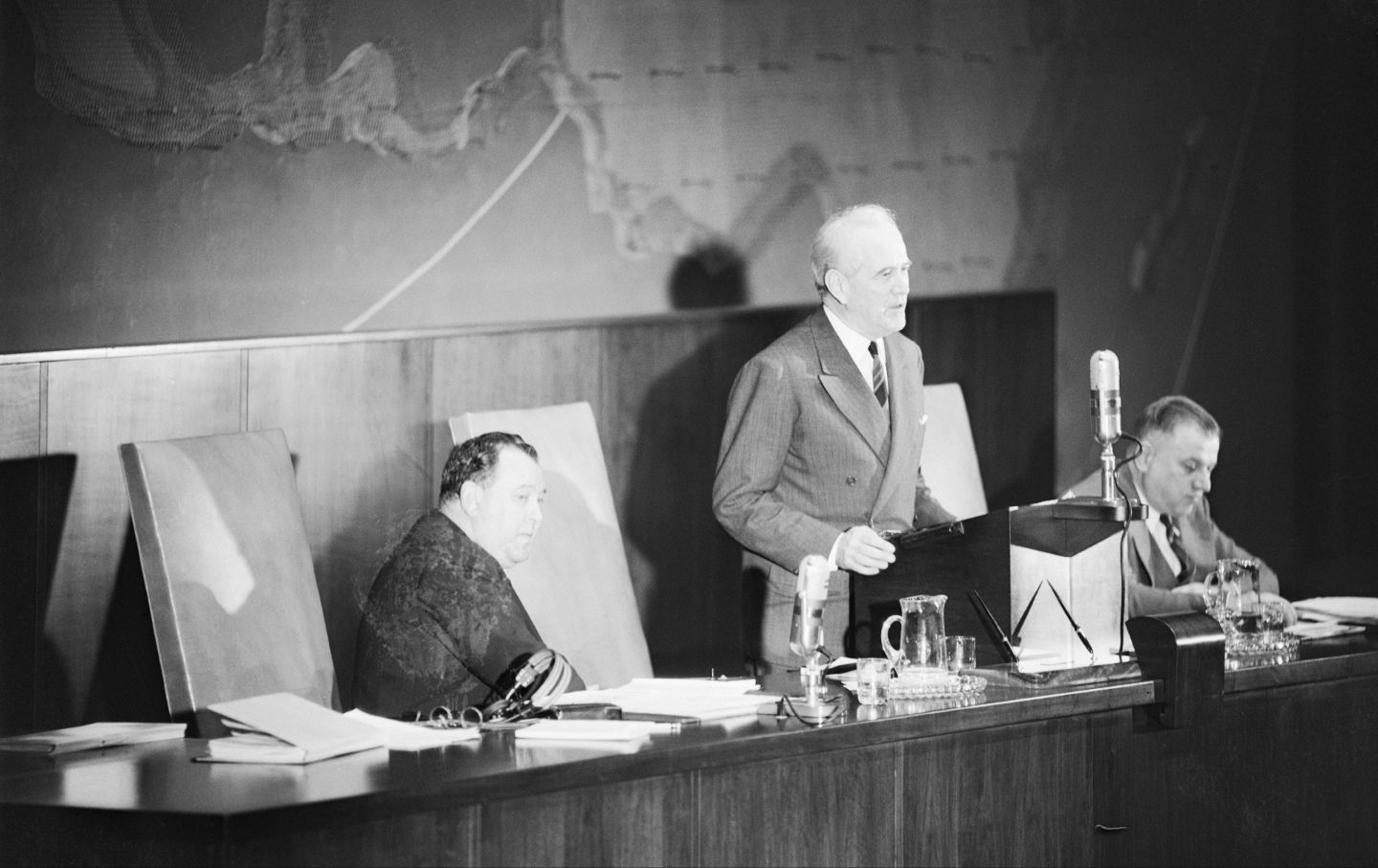
The UN Has Generations of Palestinian Blood on Its Hands The UN Has Generations of Palestinian Blood on Its Hands
Though it is often seen as a target of Israeli aggression, the UN has always played a crucial role in the oppression of Palestinians.
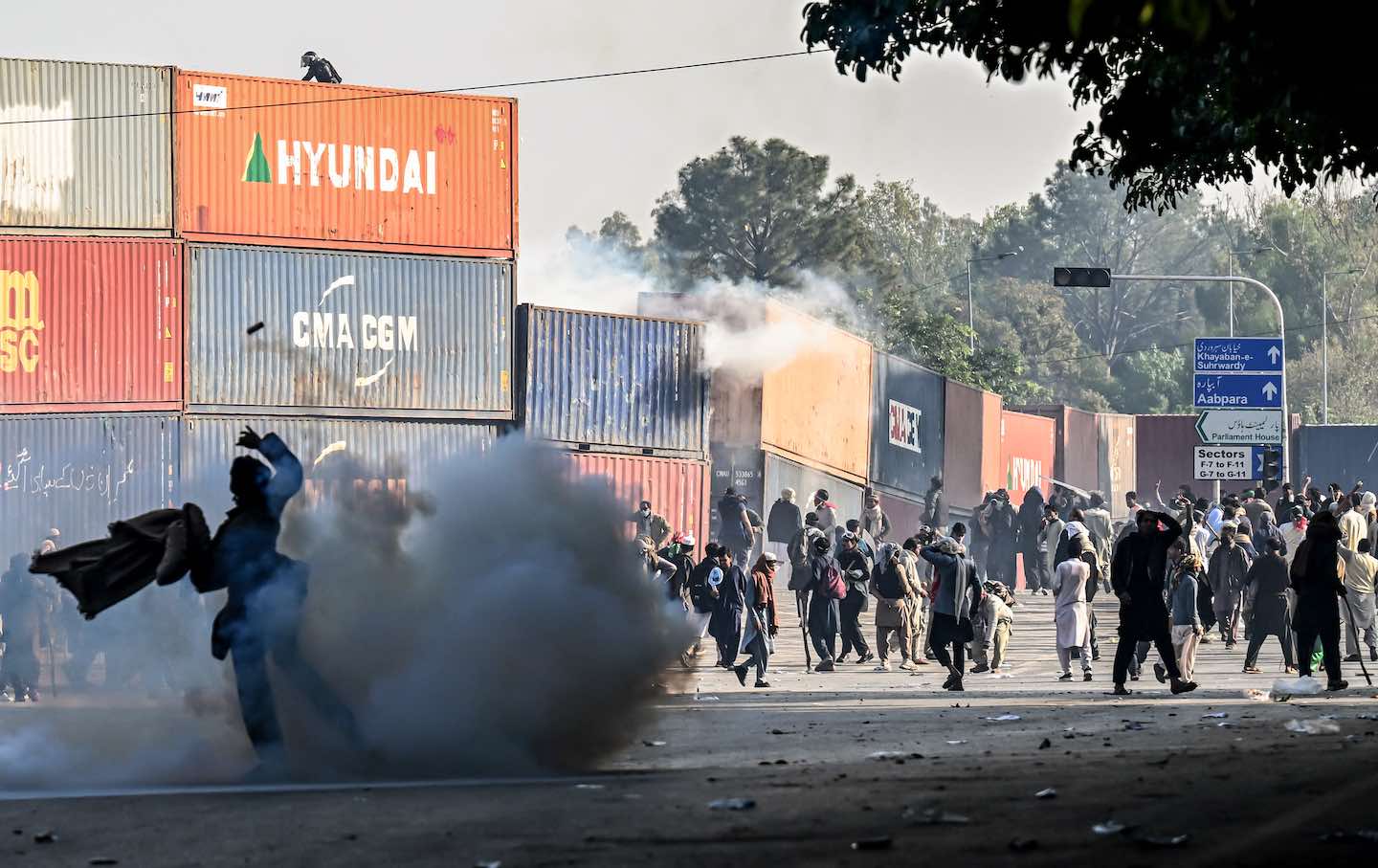
A State Crackdown in Pakistan Threatens Continuing Unrest A State Crackdown in Pakistan Threatens Continuing Unrest
Protesters in support of Imran Khan’s PTI party were met with obstruction and violence, leading to mounting public outrage.
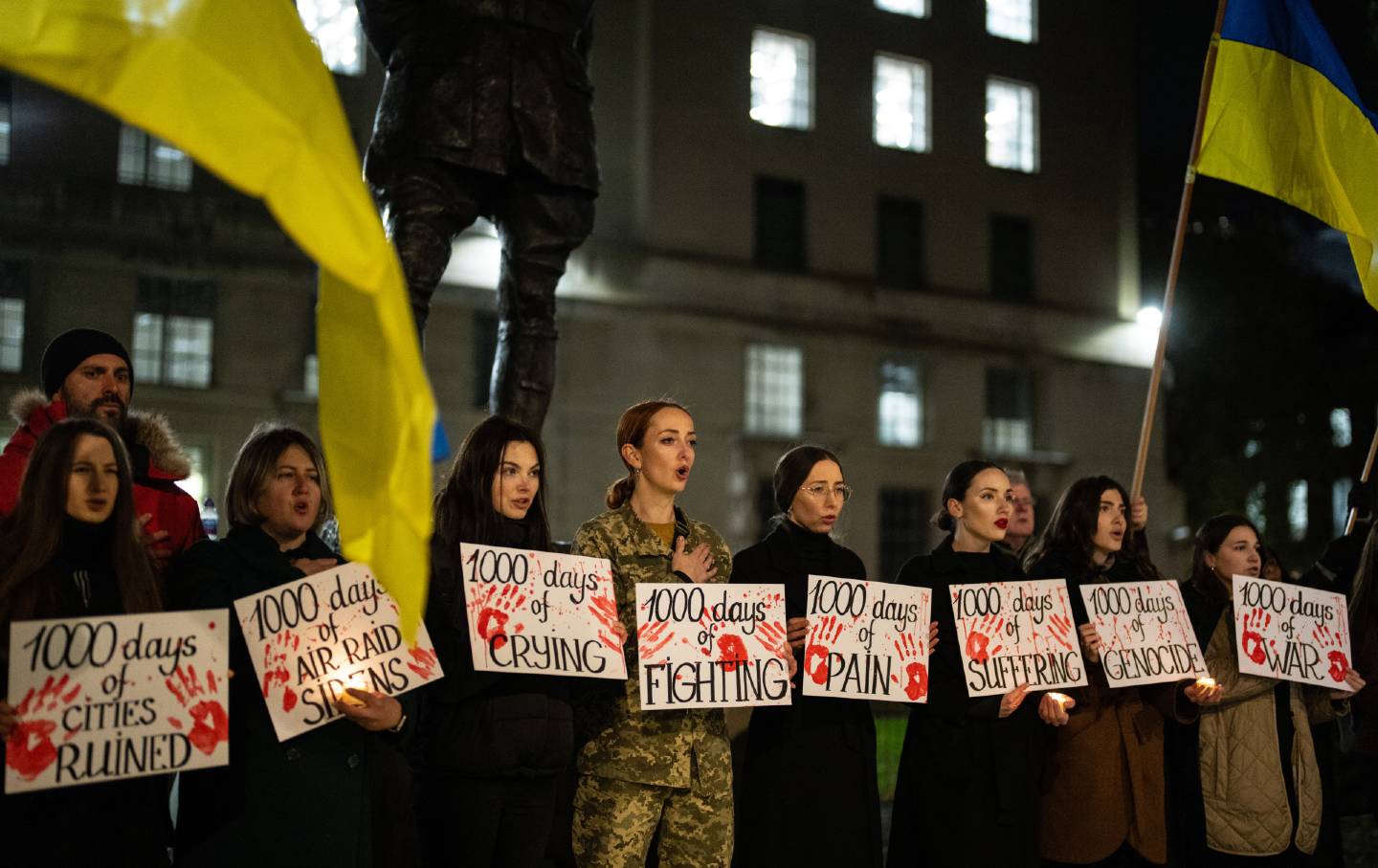
How the War in Ukraine Has Been a Major Contributor to Global Inflation How the War in Ukraine Has Been a Major Contributor to Global Inflation
And it has been a strategic boon to the far right at home and abroad.
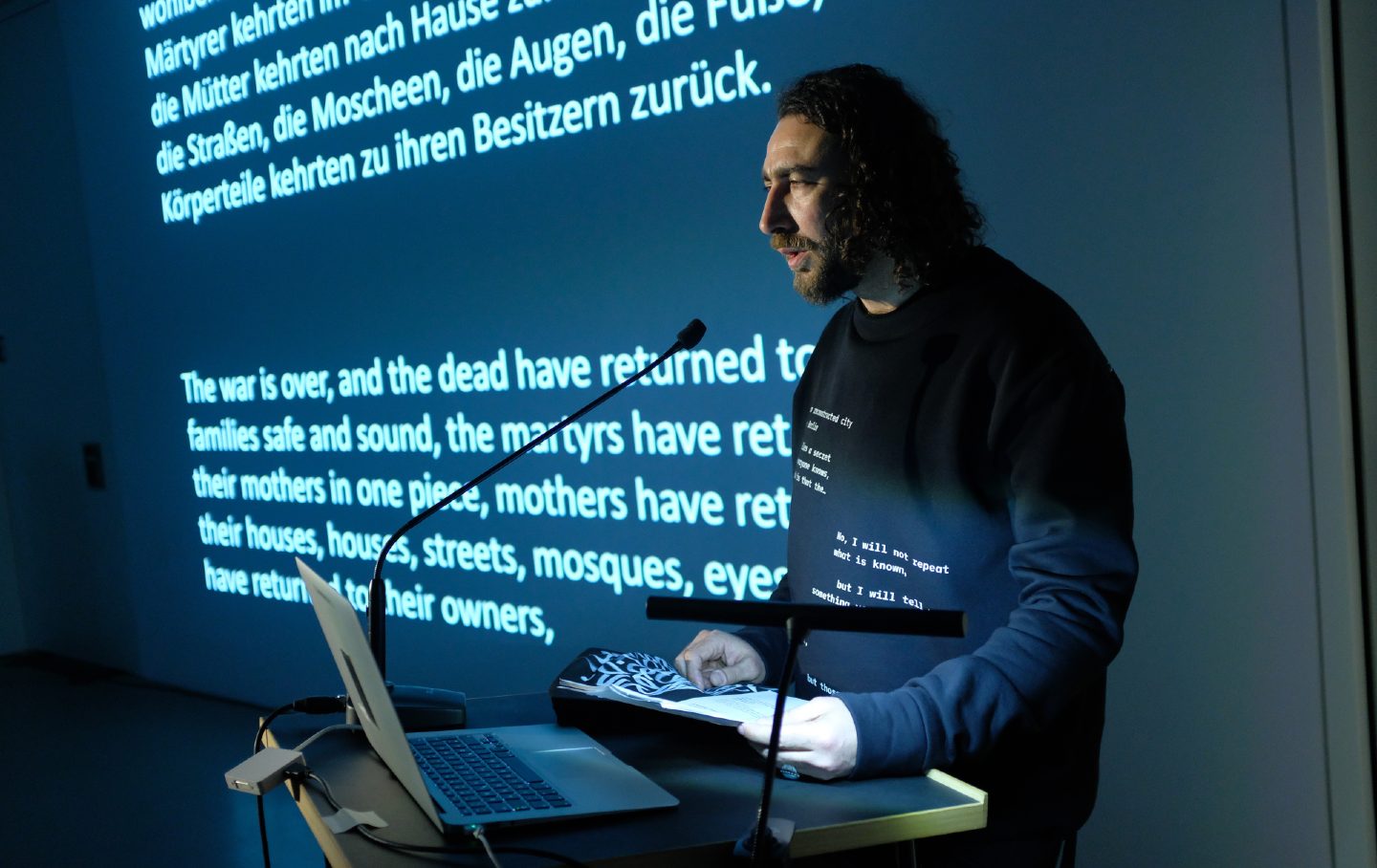
The Exiled Palestinian Poet Fighting Censorship in Democracies The Exiled Palestinian Poet Fighting Censorship in Democracies
Ghayath Almadhoun had a poetry event in Berlin canceled simply because he’s Palestinian. At least 200 more artists have been silenced over Palestine in Germany since.

In the Zone of the Rich In the Zone of the Rich
In The Hidden Globe, Atossa Araxia Abrahamian examines what globalization has come to look like for the wealthy.

